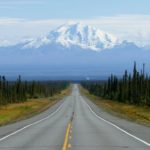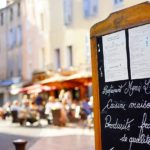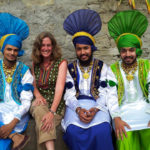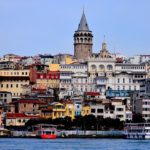Backpacking Solo in 1980’s China: In Conversation with Author Elizabeth Pilar
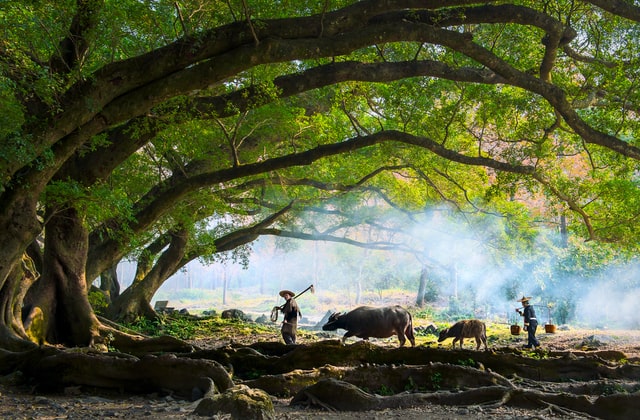
A black and white passport photo of a 20-year-old Elizabeth Pilar adorns the cover of her newly published book, A Blue Moon in China, a memoir of her odyssey through China in 1988. The photo was taken in Bangkok for her visa into China. As she smiles confidently back at the camera, there’s a certain calm in her eyes—the kind of calm before the storm that can often be found in a restless traveler before an unpredictable adventure.
Behind the cover, written thoughtfully in her 400-hundred-page travel journal, lay the excitement, anxiety, passion, determination, and curiosity of a girl who just dropped out of college to travel solo in the uncharted landscape of China that has just opened up to the foreign world.
Throughout her memoir, Pilar vividly describes the old China that predates crowded iPhone factories, glossy Louis Vuitton bags, and unbreathable polluted air, a once-upon-a-time China that I, a millennium born and raised in Beijing, could only recognize through my mother’s bedtime stories. Paired smoothly with the narrative, her analysis on the mentality of the post cultural revolution Chinese society and the role of women in a period of transition between tradition and modernity is still relevant today, almost thirty years after she finished her odyssey.
Backpacking Solo in 1980’s China: A Conversation with Author Elizabeth Pilar
Why in the world China?
The ancientness of the Chinese culture has always intrigued me. My earliest impression of the country was from a series of six reproductions of engravings of China in the late 1800s that hung in our house. My mother loved Pearl S. Buck, and so these were a treasured purchase she made just before I was born, and I was fascinated by them. I didn’t know much about the reality of China in 1988. We didn’t learn about China in school.
The real reason I went there happened while I was in Bangkok. While there I was told that China was very inexpensive to get around, and given that I was already intrigued, I decided to go there and see how long my money would last.
What kind of research and preparation did you do in order to choose the cities you were about to visit? What about means of transportation?
Truth is, in China I didn’t “choose” a particular city for any particular reason other than that was the next place to go because that’s where the people I met along the way were going. (Those faces changed many times.) If there was a Lonely Planet Survival Kit around, I read up on the destination before I arrived.
Take the time to listen to the voices, the music, the sounds of the place you are in.
As for preparation, my main considerations were having enough food and hot tea for the duration of the next segment of travel. Other than that, I made due with what I had with me. I did pick up useful things if I could, like a rain cape. If not, I just went without. I didn’t spend a lot of time shopping, not only because there was so much to see otherwise, but also I had to carry everything with me everywhere I went.
In a way, traveling third class, I was in survival mode. It was a matter of preparing my psyche for flexibility and endurance – China is vast – more than anything else.
Deciding on which means of transport was simple as there was only one for each segment – bus, train, or boat. Then it was just a matter of figuring out how to get tickets, pay for them, and where and when the departure took place. That could be tricky at times.
As a foreign woman traveling solo in a China that has just opened up to the Western world back in 1988, what were some of the biggest challenges?
Well, I’ve blocked out most of the bathroom experiences from my memory… Other than that, I don’t think being a woman made anything more difficult in China. I never felt fear for my safety or security during my travels there.
Being a foreigner was the real issue and that could make things very difficult. The language barrier was one reason, two different currencies was another. Getting on and off of buses and trains proved to be challenging at times, too, due to the number of other people doing the same. I’m not very big.
One thing that was interesting was that it seemed like most of the local people had never seen someone from outside China as the country had been closed off from the rest of the world for so long. When I was there it had only been open for ten years, thus, the general public had minimal exposure to Westerners. We travelers were quite a novelty. Sometimes that was an advantage, other times, not so much.
When you were telling your friends, family, and perhaps the Chinese locals about your decision to travel across China, what was their reaction?
Before I left for Southeast Asia, there was some discussion about my going to China. My mother had romantic notions about the possibility and bought me a picture book called Heart of the Dragon. My stepfather thought it was amazing I had the opportunity to travel to Asia at all. And, my aunt couldn’t understand why I wanted to go to the Far East, and not Hawaii.
One local I had a conversion with about traveling through China was a man named Wu. He wanted to lead the way. Another man was a professor, and he reminisced about his own journey to Beijing as a teenager to see Mao Zedong.
Backpacking Solo in 1980’s China: A Conversation with Author Elizabeth Pilar
You experienced so many difficulties when you were traveling: language and cultural barrier, financial problem (FEC and RMB conversion), sanitary and food safety concerns…Did you ever think about giving up and picking up a one-way ticket home? If yes, what made you stay instead?
Once I was on that first train from Guilin to Kunming, there was no turning back. I didn’t want to, either. I was fully aware that being in China was totally special. In fact, I wanted to experience as much of the country and its people as possible, and I wanted to go to Beijing. My main concern, then, was making my money last so I could get there, and then back home.
You wrote about your romance with a fellow traveler Maxim whom you met in a youth hostel in China. How does this “on the road” relationship that you two shared during your travels change your perception and understanding on relationships in general?
Good question. I would say that I do my best to be unattached to outcomes, that I try to let the relationship unfold organically, and end it as well as possible. I see relationships as an adventure, a step into the unknown. Falling in love quickly can be tricky, trying not to lose oneself, and, yet, to give into the flow. The Cinderella happily-ever-after paradigm is still side-by-side an independent Alice on her own adventure.
I try and learn about myself, and the world around me, through friendships and relationships. I ask myself what I want and what I like, and what I don’t want or like. Sometimes that takes years to figure out, sometimes it’s a matter of minutes. The most important thing for me is to be open to the experience, and to be honest both with myself and the other person. All the while being keenly aware that the only certainty in life is the present moment.
How was the China you saw different from the China you thought you knew before you started your journey?
In addition to the engravings I mentioned earlier depicting Imperial China, I grew-up going to the Detroit Institute of Arts, a world-class museum. I saw ink paintings on silk and ceramics and other objects de art from different Dynasties. But again, this was all ancient China, and somewhat romanticized in my mind.
Somehow, maybe because there were so few of us travelers with backpacks, we weren’t a concern for the government.
Other than the fact that modern day China was communist, I knew nothing about it. When I arrived, I was overwhelmed by the population. I saw only remnants of traditional China. Many of the Chinese people were dressed in Western-style clothes. Then later, I saw a few old ladies wearing the Mao suit, and in out-lying regions, many minority people wore their traditional dress.
The modern buildings were cement blocks in the Soviet-style interspersed with the surviving examples of Imperial Chinese architecture. The infrastructure was old, yes, but I came from Detroit, so a neglected, crumbling infrastructure was normal to me.
As for what a communist country meant to me, well, those were places with Big Brother who planted spies to watch what people said and did. In 1988, however, once my passport was stamped, I had no “official” contact with anyone. I went wherever I wanted without the Chinese government knowing, or asking. Somehow, maybe because there were so few of us travelers with backpacks, we weren’t a concern for the government.
How did you integrate your experience in China into your life back in the United States?
Before I flew to the Far East, I was already a humanist at heart, having been raised to care for other people in my community and the world over. I found some things in communism that appealed to that part of me – at least it looked like everyone had clothes, food, shelter, and warmth. Being that I grew-up in Detroit, I saw that lack acutely in my own hometown where the homeless winter outside. Also, I was told the Chinese people had free education, healthcare, and that women were considered equal to men.
However, the totalitarianism of the government was unnerving. Not toward me. But in terms of the Chinese people, especially how quickly and consistently (to this day) human rights activists, artists, writers, etc. are targeted as “dissidents” and punished.
Backpacking Solo in 1980’s China: A Conversation with Author Elizabeth Pilar
Learning about the Cultural Revolution was disturbing. I became aware how easy it is to sway a population to do horrible things to each other. Also, because I was in China the year before the Tiananmen Square Massacre, and had had so many incredible experiences meeting locals, when I watched the PLA fire on people who I had just sat next to on trains and buses and had stood in line with, my heart broke.
Yet I felt a wonder, an appreciation, an amazement that so many people took to the streets to show their anger, concern, and hope. It made me even more aware how precious my freedoms in America were.
What is your next destination and what travel advice you would like to give for your fellow travelers?
My book tour across the U.S. is next up, and soon – this June! I’ll be doing a huge social media blitz throughout it all.
The first bit of advice I have for travelers – women travelers – is to stay sober. Seriously. I want you all to keep your wits about you. Be aware of where you are at, who you are with, and what is going on around you. And use condoms if you decide to have sex with a man. For real.
Backpacking Solo in 1980’s China: A Conversation with Author Elizabeth Pilar
Also, take the time to listen to the voices, the music, the sounds of the place you are in. Try to meet someone who lives there and ask for ideas of where locals go to eat, for recreation, cultural experiences, etc. I like to learn some of the history of the place I’m visiting.
Oh, and pack light.
Backpacking Solo in 1980’s China: A Conversation with Author Elizabeth Pilar
Have you backpacked? How was your trip? Email us at editor@pinkpangea.com for information about sharing your experience and advice with the Pink Pangea community. We can’t wait to hear from you.
Backpacking Solo in 1980’s China: A Conversation with Author Elizabeth Pilar photo credits: Unsplash.

